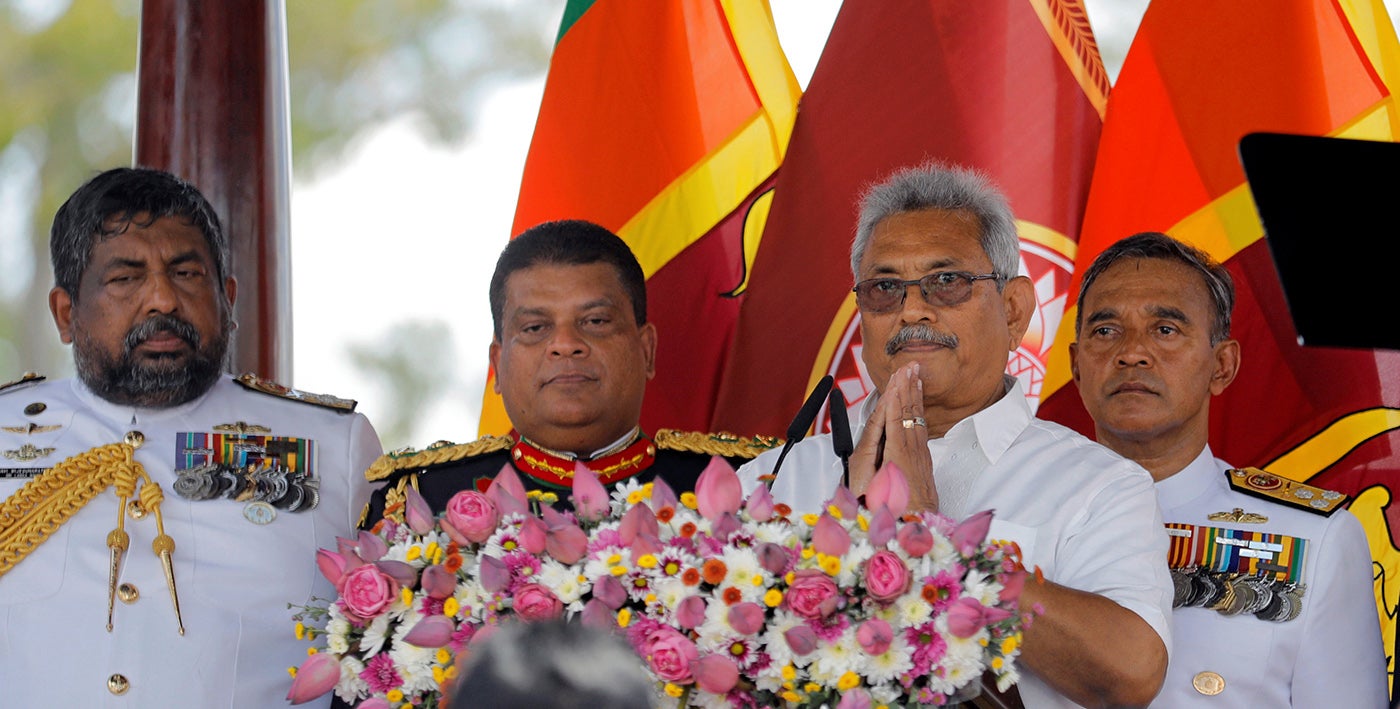Weak Response from Country Core Group Ignores Victims’ Plight

John Fisher, Geneva Director @JohnFisher_hrw
by John Fisher, Human Rights Watch, March 3, 2020
https://www.hrw.org/news/2020/03/03/un-rights-council-should-uphold-sri-lanka-commitments
During his presidential campaign and after his election, Gotabaya Rajapaksa left little doubt that Sri Lanka would not enforce its commitments on justice and accountability agreed to at the United Nations Human Rights Council. So the foreign minister’s announcement in Geneva last week that Sri Lanka was withdrawing from the 2015 resolution that addressed crimes by all sides during the 26-year civil war was no surprise.
After all, many leading figures in the new administration – including President Rajapaksa, who was defense secretary when the war ended in 2009 – have been implicated in alleged war crimes.
So it was particularly disappointing that the UN Core Group on Sri Lanka – including the United Kingdom, Canada, Germany, North Macedonia, and Montenegro – did not stand by the numerous victims of abuses by calling for renewed Human Rights Council action. In its statement, the Core Group merely “encourage[d] the government of Sri Lanka to continue cooperation and dialogue” – a naïve appeal in the face of the Sri Lankan government’s explicit repudiation of its commitments.

Gotabaya Rajapaksa (second from right) at his presidential swearing-in ceremony in Anuradhapura, Sri Lanka, November 18, 2019. © 2019 REUTERS/Dinuka Liyanawatteo it was particularly disappointing that the UN Core Group on Sri Lanka – including the United Kingdom, Canada, Germany, North Macedonia, and Montenegro – did not stand by the numerous victims of abuses by calling for renewed Human Rights Council action. In its statement, the Core Group merely “encourage[d] the government of Sri Lanka to continue cooperation and dialogue” – a naïve appeal in the face of the Sri Lankan government’s explicit repudiation of its commitments.
UN rights body should ensure accountability in Sri Lanka, independent reporting on Xinjiang, and annual updating of OPT database
Human Rights Watch, Geneva, February 28, 2020
Statement on Item 2 General Debate at HRC43
We welcome the High Commissioner’s release of the database of businesses contributing to illegal Israeli settlements. The report brings a degree of transparency to business activities and helps build pressure on companies to stop contributing to rights abuse and to comply with their human rights responsibilities. As the report notes, the Human Rights Council has already decided that the database should be updated annually, and the Council should act this session to ensure this important work can continue.
The High Commissioner has rightly insisted that any access to China’s Xinjiang region should be unfettered, so that she can conduct the in-depth analysis of the human rights situation in the country that is sorely needed. Surely no state can object to independent access and reporting so that the Council is better informed of the situation – even China claims it supports this goal. We therefore call on all delegations to publicly support the High Commissioner’s call, including presentation of a full report to the Council. No state should tarnish its credibility by endorsing China’s ludicrously self-congratulatory counternarrative until the Council has received a full independent assessment.
From the moment the Rajapaksas – implicated in war crimes – resumed office, they made it clear they intended to walk Sri Lanka away from the Council resolutions. Of course, withdrawal of cosponsorship is not possible more than two weeks after a session ends – all Sri Lanka has done is announce that it does not intend to honor its commitments to this Council, turned the resolution process from a consensual to a contested one, and joined the ignominious ranks of Myanmar, Syria and North Korea in refusing to accept responsibility for grave human rights violations.
There is no prospect that yet another domestic commission will advance justice for the tens of thousands summarily executed, tortured or forcibly disappeared. Apart from the long history of failed commissions, the OHCHR Investigation on Sri Lanka made clear that a purely domestic process could not promote meaningful accountability due to lack of judicial independence, risk of reprisals, political interference, and “the deep-seated and institutionalized impunity that generates the risk of such violations being repeated.”
The High Commissioner has stressed that Sri Lanka’s repeated failures to “establish a trustworthy domestic mechanism to address impunity” mean alternatives such as international investigations and prosecutions are needed. Sri Lanka has had its opportunity. Now the Human Rights Council needs to create an international accountability mechanism as a matter of urgency.